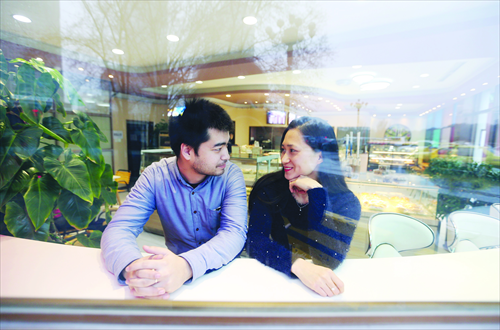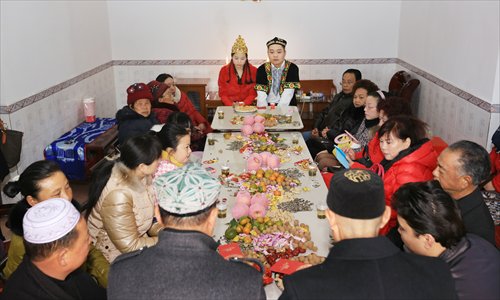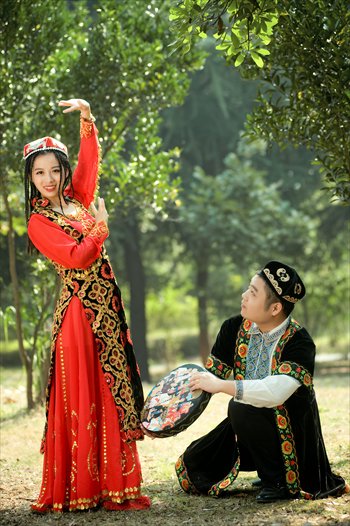Uyghur-Han couples face pressure from those seeking ‘purity’ of culture
Interethnic economic and cultural exchanges have not caused an increase in marriage between Xinjiang's Uyghur and Han communities. Today, such couples are a rarity due to pressure from both communities, especially after mass terror attacks in 2009. Many Uyghurs disagree with intermarriage as they feel their culture is at risk of being diluted.

Mawlan and his wife Ma Jie sit in a coffee shop in downtown Urumqi on November 16. Photo: Cui Meng/GT
Mawlan, 24, an accordion player, met Ma Jie, when she was deeply absorbed by his performance on a street in Urumqi in 2013. Four months later, Mawlan secretly married her without asking his parents.
"I acted first and told them afterwards. They would never allow me to marry a Han, I had no choice," explained Mawlan, born in a Uyghur family in the capital city of the Xinjiang Uyghur Autonomous Region.
His mother has accepted their marriage, but his father is still against it. "He warned me that I would regret in the future," Mawlan said.
But Mawlan doesn't think so. He is convinced that love conquers all and they can live a happy life by respecting each other's culture and customs.
Uyghurs are a majority-Muslim Turkic group with their own language. The vast majority of Chinese people identify as being of Han ethnicity.
Intermarriage between ethnic groups is not uncommon, especially in Xinjiang, which is home to 47 of the nation's 56 ethnic groups. But marriage between Uyghurs and Han people in the region is extremely rare, although they make up the majority of Xinjiang's population, accounting for 48 percent and 37 percent respectively of the region's total.
In the past 20 years, communication between Uyghurs and Han has increased, but the boundaries between the communities are now more strict and stark, and both group's sense of ethnic identity and distinctiveness has grown, Li Xiaoxia, director of the Institute of Sociology with Xinjiang Academy of Social Sciences, said in her research paper published by Sociology of Ethnicity magazine in 2012.
"As religion is becoming more prominent in Uyghurs' daily life it's getting increasingly difficult for them to marry Han," Li noted.

Jian Jian, a Uyghur, marries a Han in January this year in Fengshu, Taoyuan county, Central China's Hunan Province. They had a traditional Uyghur wedding and the bridegroom was asked to convert before the marriage. Photo: Courtesy of Jian Jian
Group pressure
Despite living near Mawlan's parents, Mawlan and Ma Jie seldom see them, even during festivals, to avoid awkwardness.
The couple also suffers from peer pressure. They didn't have a wedding ceremony and Mawlan still keeps his marriage a secret from some of his relatives and friends. While walking in the city's mostly-Uyghur Erdaoqiao area, they don't walk close to each other as they might face an unfriendly public reaction.
Sometimes Mawlan lies about his wife. "I say she is from the Hui ethnicity, who are also Muslims but look like Han," he said.
Ma Jie said she doesn't mind. Most young Uyghur interviewees said they never thought of finding a Han spouse, citing different habits, customs and religious belief as barriers. Some Han people also gave similar answers but others said that ethnicity isn't important.
A violinist who was born in a Han family in Urumqi, Ma said her parents didn't oppose her marriage. "My parents are open-minded. They are OK as long as I am happy," she said. "I will try to follow my husband's customs."
Although she was not required to convert, she has gotten used to Halal food. She says she will allow Mawlan to raise their children as Muslims.
Ma's experience echoes findings by sociologist Li Xiaoxia that the obstacles for intermarriage largely come from the Uyghur side.
Li has spent years researching intermarriage in Xinjiang. She says that the Koran says that Muslims can't marry non-Muslims unless they convert.
Lu Zicheng, 36, a Han, married a Uyghur girl from Kizilsu Kirghiz Autonomous Prefecture in westernmost Xinjiang in 2003. He told the Global Times that he has sought acceptance from his wife's mother, but her uncles have rejected them.
"The inter-religious contradictions are too difficult to break through," an ethnically-Sibe headmaster of a primary school in Yili Kazak Autonomous Prefecture told the Global Times.
He recalled that in the early 1980s, his elder brother fell in love with a Hui girl. But one day the girl's parents showed up and beat her before taking her away.
Li said in her investigative report that beatings and threats were also often used by Uyghur families to prevent inter-ethnic marriages.
The central government has been alert to the issue of intermarriage. In an effort to avoid complaints and instability, the government historically discouraged intermarriage in the region.
However, in 1996 Xinjiang adopted marriage regulations which clearly specify that any couple who marry of their own free will shall not interfered with by any organization or individuals.

Jian Jian, a Uyghur, marries a Han in January this year in Fengshu, Taoyuan county, Central China's Hunan Province. They had a traditional Uyghur wedding and the bridegroom was asked to convert before the marriage. Photo: Courtesy of Jian Jian
Ethnic rift
Lou Li, a marriage registration official from the Yining Bureau of Civil Affairs in Yili, Xinjiang, said the number of marriages between Han and Uyghurs is very small.
"There are just two or three couples a year. In some years, it is zero," Lou told the Global Times. "And we've found that Uyghurs who marry Han are almost all from multi-ethnic families, instead of purely Uyghur families."
In Yining 48 percent of people are Uyghurs, 36 percent are Han and 7 percent are Hui.
There are more marriages between Hui and Han than Uyghurs and Han, she said. "The Hui speak Putonghua and they look like Han," she explained.
Some believe that apart from religion, the political rift between Uyghurs and Han is a major barrier.
A Han taxi driver in Yining said he would never marry a Uyghur. "Apart from our different habits and beliefs, we hate each other. They hate us for taking away their resources, we hate them for killing our fellows," said the driver. He said he seldom talks with Uyghurs.
However, an armed police officer in Yining said most Uyghurs are friendly to Han. "When we go running in rural areas or patrol the streets, there are always Uyghurs who pass us apples, bananas or instant noodles," said the officer.
Both Mawlan and Ma Jie claim that ethnic relations were better when they were children. "In childhood, we had no idea about ethnic differences and always played together," they said. "Uyghurs would invite Han people to weddings."
But in recent years, especially after a spate of terror attacks, the couple said the political conflict is on everyone's minds and relations between the two groups has become tense.
To "promote national solidarity and convergence," Qiemo county of Bayingol Mongolian Autonomous Prefecture piloted a policy since August last year, handing 50,000 yuan ($7,800) to newlywed interethnic couples in which one member is a Han. Such families can also enjoy additional allowances for schooling and medical costs, according to China News Service.
However, it seemed that the policy was ineffective. Two locals in Qiemo, a county in southern Xinjiang in which around two thirds of people are Uyghurs and the rest are mostly Han, told the Global Times they didn't witness an increase in intermarriage.
The policy has also drawn wide criticism. An official from the county's publicity bureau told the Global Times last week that they "suspended the policy after receiving wide external slander" and asked the Global Times reporter not to write about it.
Young people in dilemma
As Uyghurs' livelihoods improve, they have begun to devote more time to spirituality and a focus on ethnic and cultural purity has become more widespread, Li wrote in her report.
Hasan Junayd, 49, who works in Urumqi's forest bureau, said it's understandable that some Uyghurs oppose intermarriage.
"Uyghurs have spent decades studying Han culture and language. We have a sense of crisis that we are being assimilated and most opponents of marriage just want to protect Uyghur culture," Hasan told the Global Times.
But on the other hand, it seemed that the Uyghurs have become more introverted and conservative.
Uyghurs are traditionally moderate Muslims and in past veils were rarely worn by women, let alone hijabs or burqas. In recent years, more hardline religious teachings have changed Uyghur practices and made the community more introverted.
Interethnic marriage is now more frowned upon and even vehemently opposed due to the impact of more conservative strains of Islam brought from overseas.
The awareness of ethnic and religious identity among the Uyghurs is increasing, and the relationship between Uyghurs and Han is changing. Much of this is related to the propaganda and other activities of separatists and extremists, argues sociologist Li Xiaoxia.
In her survey, she found that whether an interethnic couple lives a Muslim lifestyle mainly depends on the ethnic makeup of their local community.
Lu Zicheng who lives in Qapqal Xibe Autonomous County in Yili said he and his wife had a Han wedding. As most of their neighbors are Sibe or Han, their choice to live a Han lifestyle is accepted by the community.
In urban Xinjiang, young Uyghur people are much like their Han peers. Many can speak Putonghua and do not wear traditional Uyghur garb. Some young people no longer practice Islam regularly and even drink and smoke.
Hasan said some worry that intermarriage would accelerate the fading of tradition. However, he believes that integration is a trend that can't be stopped.
"I will not intervene in my children's marriage. By living together and studying from each other, ethnic differences will finally disappear," he said.
Mawlan's father feels uneasy about the trend. According to Mawlan, last year, his parents made his 16-year-old brother transfer to a bilingual school from a Putonghua-only school.
According to a reporter that focuses on education based in Urumqi, the number of students enrolled in bilingual schools in Urumqi this year has surpassed the number enrolled in Putonghua-only schools for the first time.
Mawlan said culture and beliefs are not immutable. He argues Uyghur culture is not a "purely Islamic" culture as it has a rich traditional of music and dance, things the Koran prohibits.
Ma Jie said to avoid inconvenience, when his father passed in September this year, she didn't ask Mawlan to go to the funeral.
But Mawlan's parents worried that conflicts would emerge when they have children. Some children of Uyghur-Han marriages find it hard to reconcile their parents' customs.
Aifei, a Uyghur girl said one of her classmate met such a dilemma when her grandmother died, her parents fought over whether she had to wear a black armband after the funeral, a custom Han people use to mourn the recently deceased. Her mother wanted her to but her Uyghur father disagreed with this.
Taber, 22, son of an interethnic couple who had studied at a Putonghua school, said he was sometimes confused about his identity. "I feel the Uyghurs do not accept me. The Han sometimes exclude me due to my appearance," he said.
He applied to join the Communist Party of China while studying in college in Beijing and now works as an accountant in a public organ in Urumqi. He has a Han girlfriend. "I will respect the culture of each side," he said.
Newspaper headline: Marriage of inconvenience